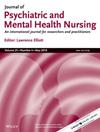Experiences of restrictive interventions in psychiatric health care from the perspectives of patients and health care professionals: Meta-synthesis of qualitative evidence
Abstract
What Is Known on the Subject
- Following their experience, patients with physical restraints often experienced traumatic sensations.
- The experiences of healthcare professionals' (HCPs') are primarily concerned with moral distress or conflicts between loyalty to the treatment and oppression of the patient's freedom when implementing RIs.
What the Paper Adds to Existing Knowledge
- Improving the competency of HCPs can help establish therapeutic relationships rooted in compassionate care and facilitate appropriate assessments to determine whether and how often RIs are necessary. Furthermore, fostering an environment that guarantees patient safety and dignity, assuring a sufficient staffing ratio, and providing opportunities to share RI experiences can help improve the quality of care and build safe environments for RIs.
What Are the Implications for Practice
- Effective interaction between HCPs and patients, thorough patient assessment, and compassionate patient care may improve competency of HCPs intervene RIs procedures. Creating a safe therapeutic environment, including improvements to structural environments, increasing the staff-to-patient ratio, establishing organizational policies that guarantee staff debriefing, provide emotional support, provide appropriate training programs to HCPs to their coping skills during RIs also reduce the use of RIs and improve the quality of mental health care.
Introduction
Restrictive interventions (RIs) are used in psychiatric inpatient units for ensuring safety. However, few studies have comprehensively reviewed physical restraint and seclusion experiences from the perspectives of both patients and healthcare professionals' (HCPs'). This study aims to gain an in-depth understanding of the RI experiences of mental health inpatients and HCPs.
Methods
A meta-synthesis was undertaken of qualitative studies exploring the RI experiences. Five electronic databases were searched and additional manual searches were performed for studies published within the last decade. Twelve articles were included, and a thematic analysis was conducted. The Critical Appraisal Skills Program (CASP) checklist was used to assess data quality.
Findings
Two main subthemes were identified: ‘Competency of HCPs’ (three subthemes: interaction between patients and HCPs, assessment methods, and care) and ‘systems’ (three subthemes: environment, protocols with training, and debriefing), including both positive and negative experiences.
Discussion
The Competency of HCPs and the ward environment are critical factors related to patients' unmet needs. Effective interactions between HCPs and patients, thorough patient assessments, and compassionate patient care are important elements of RI implementation.
Conclusion
An environment that guarantees safety and care with dignity, sufficient staffing ratios, and opportunities to share RI experiences may improve quality of care and create safe environments for RIs.

 求助内容:
求助内容: 应助结果提醒方式:
应助结果提醒方式:


